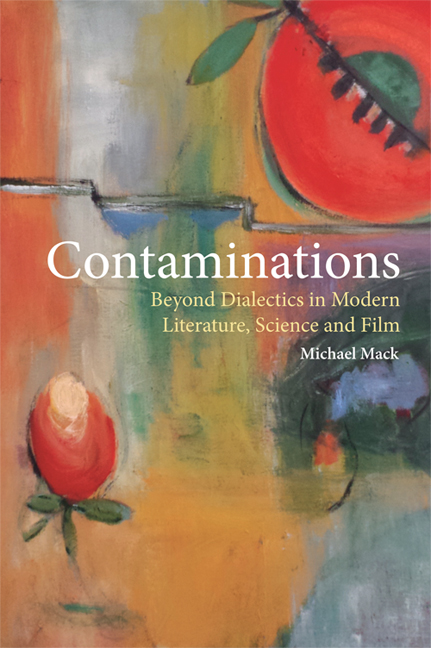Book contents
- Frontmatter
- Contents
- Acknowledgements
- Dedication
- Introduction: Climate Change and the Contamination of the Anthropocene
- 1 Contaminating Psychology with Biology: Descartes, Spinoza, Freud and Žižek
- 2 Contaminating the Visible with the Invisible: From Einstein via H. G. Wells to Hannah Arendt, Luhmann and Derrida
- 3 Contamination of Nature with Society: The Collapse of Natural Order from Melville to Wells and Ellison
- 4 Contaminating Judgement with its Suspension: Guilt and Punishment in Walter Benjamin, Herman Melville and Henry James
- 5 Contaminating the Digital: Action and Perception in Henry James and Alfred Hitchcock
- 6 Contaminating the Sacred with the Profane: Pier Paolo Pasolini and Biopolitics
- 7 Contaminating Posthumanism
- Bibliography
- Index
7 - Contaminating Posthumanism
Published online by Cambridge University Press: 05 August 2016
- Frontmatter
- Contents
- Acknowledgements
- Dedication
- Introduction: Climate Change and the Contamination of the Anthropocene
- 1 Contaminating Psychology with Biology: Descartes, Spinoza, Freud and Žižek
- 2 Contaminating the Visible with the Invisible: From Einstein via H. G. Wells to Hannah Arendt, Luhmann and Derrida
- 3 Contamination of Nature with Society: The Collapse of Natural Order from Melville to Wells and Ellison
- 4 Contaminating Judgement with its Suspension: Guilt and Punishment in Walter Benjamin, Herman Melville and Henry James
- 5 Contaminating the Digital: Action and Perception in Henry James and Alfred Hitchcock
- 6 Contaminating the Sacred with the Profane: Pier Paolo Pasolini and Biopolitics
- 7 Contaminating Posthumanism
- Bibliography
- Index
Summary
Introduction: posthumanism, biopolitics and the figure of contamination
This chapter will analyse the ways in which we can see both posthumanism and bio-political theory in the new context of contamination. Both theoretical approaches are capable of contaminating what have traditionally been posited as opposites: human and animal, nature and society, mind and body, natural and human history. The bio-political concern with life has an emancipatory potential. As Miguel Vatter has recently put it: ‘The constitution of a life-world makes possible “man” as a species because from the start it identifies human life as a form of animal life that additionally has the capacity of being-political or being-rational’ (Vatter 2008: 48). This new understanding of biopolitics liberates embodied life from the traditional sovereign rule of the cerebral (going under various names such as law, medicine, economics and politics). Instead of subordinating one to the other – mind to body or body to mind – a parallelism between the two comes into the purview of scientific and philosophical discourse, a Spinozan parallelism which, according to contemporary neuroscientist Antonio Damasio, has always constituted our life in an embodied, natural environment. As we will see, like bio-political theory, posthumanism emerges from mid-twentiethcentury schools of thought such as poststructuralism, deconstruction, feminism and subaltern studies. What these schools have in common is a hermeneutics of suspicion as regards claims to universalism.
Contamination as both an idea and a way of life, however, allows us to conceive of the common or the universal not in the traditional terms of inclusion or exclusion but as the interdependence of what has so far been seen as incompatible. Firstly we will see how posthumanism shares with bio-political theory a critical concern with what traditional forms of philosophy, science, economics and politics have excluded from a supposedly inclusive conception of life. However, the main part of this chapter discusses how we can come to understand both posthumanism and a critical engagement with biopolitics as transgressing twentieth-century forms of theory at the point at which a new universal emerges under the sign of contamination. Contamination is truly universal because it has outdone the binaries of inclusion and exclusion with which subaltern studies, feminism and deconstruction have rightly taken issue.
- Type
- Chapter
- Information
- ContaminationsBeyond Dialectics in Modern Literature, Science and Film, pp. 191 - 215Publisher: Edinburgh University PressPrint publication year: 2016



